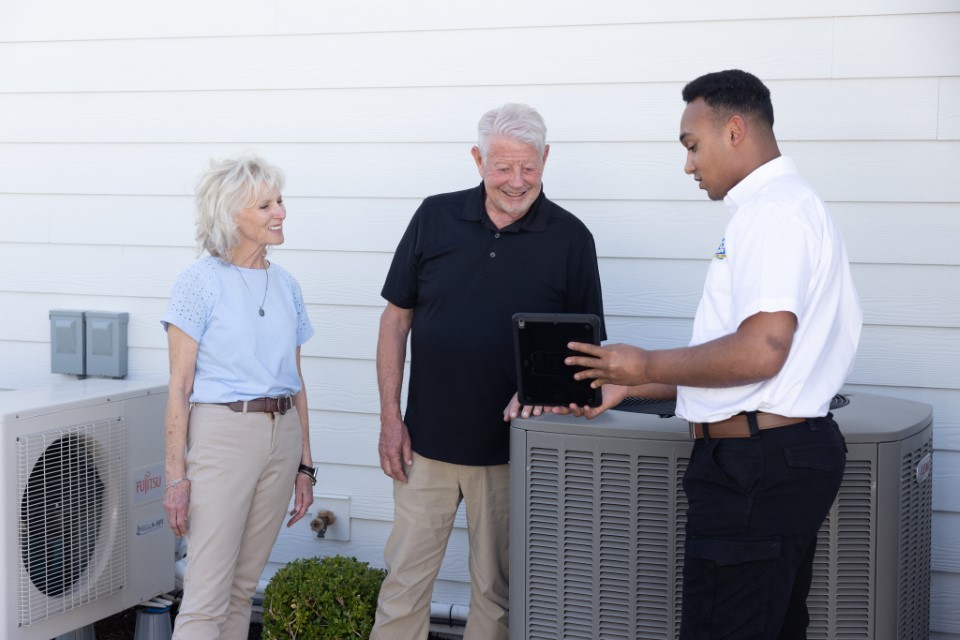4 Tips For How to Prevent Your AC Unit from Freezing Up
May 04, 2023

If you live in a hot climate, you may be surprised to discover a frozen air conditioning unit, especially if it happens on a hot summer day. AC unit freezing is quite common, although it can occur for various reasons. However, identifying the root cause and resolving it will help you avoid extensive damage that may require costly repairs in the future.
At YES!, we strive to make it simple for Utah and Nevada residents to maintain their air conditioning systems. We’ve compiled a list of everything you need to know about this issue.
What Is AC Freezing?
To know how to keep an AC unit from freezing up, it helps to understand how your system works. One of the most important parts of your air conditioner is its evaporator coils, which contain refrigerant. The AC fan pulls warm indoor air into the unit and over the evaporator coils. The refrigerant circulates through the coils of your unit, absorbing heat and releasing cool air through the indoor vents.
If something interrupts this process or goes wrong in your system, the coils may allow the refrigerant to cool too quickly, causing it to freeze. A buildup of pressure or poor airflow can cause these disruptions in the system. Moisture may further exacerbate the issue by allowing ice to form and cover the inside of the AC.
Some of the most common signs indicating that your AC unit is freezing include:
- Ice buildup on outdoor HVAC unit
- Ice on evaporator coils
- Hot air blowing from the unit
- Hissing sounds
An AC specialist can assess these problems and diagnose the cause. However, you can do some investigating on your own.
What Causes an AC Unit to Freeze Up?
Let’s look at the most common causes of this issue below.
1. Lack of Airflow
If your system’s airflow process gets disrupted and warm air stops flowing over the coils while the unit is running, it may result in your AC unit freezing up. A lack of airflow can stem from various system malfunctions. Our technicians at YES! can help determine whether the problem is the result of one of the following common causes:
- Blower Motor Damage: Damage to the blower fan can result in insufficient air blowing over the coils, causing them to freeze.
- Compromised Ductwork: Blocked or damaged air ducts in your home can prevent air in your system from flowing correctly, which can restrict airflow to the coils.
- Clogged Air Filters: Dirty air filters slow airflow, preventing the air from reaching the coils.
- Electrical Issues: If your system is underpowered, its components may not run correctly, which can cause airflow problems.
2. Low Refrigerant Level
The pressure inside your AC unit drops when the refrigerant level is low. As a result, the temperature in the evaporator goes down. Water vapor can attach to the coils, causing frost to form and build into a thicker sheet of ice.
However, low refrigerant doesn’t occur naturally, and this is a common misconception around cooling systems. Only a leak can cause a low refrigerant level, so it’s important to have a professional inspect your system to check for one.
3. Dirty Coils
Indoor air often contains dust, which can move through your ductwork through the circulation process. Your air filter should catch most of it, but some dust will still make its way into the system.
Over time, the coils accumulate dirt and will require cleaning. Unfortunately, if your coils get too dirty, they can trap cool air inside the unit, resulting in your AC unit freezing.
How to Fix a Frozen AC Unit
If you suspect (or see that) your AC unit is freezing, these simple steps can help you know how to prevent your AC from freezing, and get the system back up and running:
1. Turn Off Your AC Unit
Running your system with frozen evaporator coils can strain the AC compressor. Use your thermostat to turn off the air conditioning system, but leave the AC fan on to melt the ice.
Although it may take a while for the ice to melt, you should never try to break or melt it yourself. Using heat or force to melt or break ice can damage your unit’s components.
2. Troubleshoot the Cause of the Problem
The most common cause of a freezing AC unit is a lack of airflow. Try to figure out the reason behind the issue by taking these steps:
- Check Your Filter: If it’s dusty, replace it to improve airflow.
- Open All Supply Vents: If any of the vents in your home are closed, open them to improve airflow to the evaporator coils.
- Remove Obstructions from the Vents: Ensure that furniture, toys, curtains, and other items don’t block airflow.
- Check the Outdoor Unit: Trim back any shrubs or trees growing too close to the unit and remove any leaves or debris from the housing.
Once the system has defrosted, you can try running the unit again and check for signs of the AC unit freezing. If it persists, poor airflow may not be the cause, so defrosting your unit probably won’t resolve the problem long-term.
At YES! we can diagnose and address the cause of a freezing AC unit, which can include:
- Refrigerant Leak: Our HVAC professionals can identify the leak’s location, repair it, and ensure that your unit has the right amount of refrigerant.
- Dirty Evaporator Coil: Your HVAC technician can clean out the grime accumulated in your unit’s coils.
- Damaged Components: Broken ducts, bad motors, or closed valves can cause your air conditioner to freeze. Our technicians can repair or replace the damaged component to ensure that your unit will work properly again.
How to Prevent AC Unit from Freezing
To prevent future problems, follow these simple preventative measures for how to prevent your air conditioner from freezing over:
1. Change Air Filters Regularly: Check your unit’s recommended interval for replacing filters and stick to this schedule to ensure proper airflow while preventing the accumulation of dust and debris on your coils.
2. Clear Obstructions: Make sure air can flow through the system by keeping vents open and removing potential hindrances. In some cases, this may involve modifying the ductwork to ensure the efficiency of your unit.
3. Inspect the Condensate Drain Regularly: If water doesn’t drain from your unit, excess moisture can pass through the coils and freeze. Check for any clogs on your condensate drain by removing the cover, and if you spot a blockage, clear the clog to let water flow freely.
4. Schedule Preventative Maintenance: With the help of professionals, Utah and Nevada homeowners can pinpoint issues and their root causes, prevent underlying issues from escalating, and maintain the health of their system. Keeping up with preventive maintenance on your system is the best investment you can make into its longevity, performance, and efficiency.
During a maintenance service, one of our experienced HVAC professionals will:
- Thoroughly inspect the unit
- Check the refrigerant level
- Clean your evaporator coils
- Recommend system changes to ensure proper airflow
It’s best to schedule this service in the spring, before the summer temperatures skyrocket and you rely on your cooling system more.
Not Sure If Your AC Unit Is Freezing? Reach Out to the HVAC Experts at YES!
At YES! we know how important it is to have a working HVAC system in Utah and Nevada. For additional information on HVAC services, call our team at 844-216-9300 and speak with a technician today.
Last Updated: April 05, 2024
